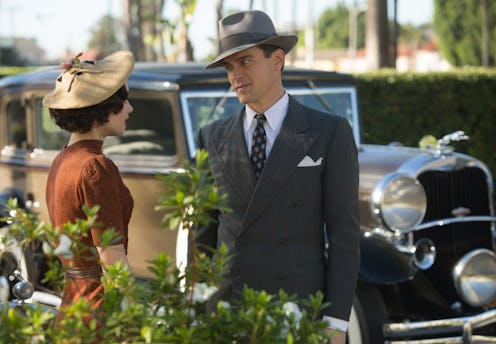
When The Last Tycoon premieres on Amazon on Friday, July 28, viewers will find themselves immersed in a world where warring movie studio executives match wits, young stars have big dreams, and Matt Bomer's cheekbones can slice you straight through the screen. But is The Last Tycoon based on a true story? Or is the new series merely a fabrication, a vehicle designed solely to costume the Golden Globe-winning star of The Normal Heart in tailored period suits and make him look as handsome as humanly possible?
Well, the answer is… a bit of both. The show is based on something, as most Hollywood products are these days. The Last Tycoon gets its name and inspiration from the final, unfinished novel by revered author F. Scott Fitzgerald. Although the Great Gatsby novelist died in 1940 before he could complete work on Tycoon, leaving 14 of the planned 31 chapters unwritten, the book was published a year after Fitzgerald's death, with the existing content restructured and edited to more closely resemble a finished piece. The posthumous novel was later reworked in 1993 in an edition that's reportedly more true to Fitzgerald's original intent, republishing it under the author's own working title, The Love Of The Last Tycoon.
Amazon isn't the first entity to attempt a polished adaptation of Fitzgerald's unfinished work; it has been adapted many times over the years into plays, musicals, made-for-TV movies, and — most famously — a 1976 feature film scripted by playwright Harold Pinter and starring Robert De Niro, Jack Nicholson, and Tony Curtis.
But just because the upcoming Amazon series is based on a book doesn't mean it's not also based on a true story. In fact, Fitzgerald's novel itself was a thinly-veiled version of actual events; a roman à clef which, according to Publishers Weekly, "charts the power struggle of self-made, overworked producer Monroe Stahr (modeled on MGM producer Irving Thalberg) with rival executive Pat Brady (a stand-in for MGM head Louis B. Mayer)."
Although those two real-life men helped found Metro-Goldwyn-Mayer together, which would go on to become one of the biggest movie studios of Hollywood's Golden Age, Thalberg and Mayer also had a notorious rivalry, as Slate recalls, with the established Mayer viewed as the hated "bad cop" and the upstart Thalberg as the revered "boy genius." They both emphasized star power and filmmaking-by-committee, making MGM an unfriendly place for auteur directors and a very friendly place for celebrities. (Thalberg actually ended up marrying actress Norma Shearer, a future Oscar winner who Mayer himself had discovered when she was just a young ingenue.)
But Thalberg's attempts to bridge the gap between B-movies made for the masses and glamorous productions made for the sophisticates — mostly by cranking out the gangster movies that were so popular at the time — flew in the face of Mayer's insistence on "family values," Slate claims. Frictions grew so high that, when Thalberg was forced to take a leave for health reasons, he returned to MGM to find that he had essentially been forced out of his own company, replaced by Mayer's own son-in-law.
However, Amazon's adaptation is attempting to distance itself a bit from the true story Fitzgerald based his novel on. While the characters Stahr and Brady are still generally inspired by the personalities of Thalberg and Mayer, the series can't be confused with any actual historical accounts for one simple reason: Thalberg and Mayer exist in the world of The Last Tycoon as characters right alongside the fictional Stahr and Brady.
And if the series has one foot set squarely in the past, then it also has one foot set squarely in the present. According to executive producer Christopher Keyser, the fact that the novel was unfinished "gave us a little bit of leeway to say, 'You know what, even Fitzgerald didn't know exactly what he was going to do with this," he says, speaking at a press event Bustle attended. "We're going to tell a story Fitzgerald couldn't have told, because he didn't know a lot of the stuff we're talking about. He didn't know about the Nazis. He couldn't have thought of women the same way. He couldn't have thought about the underprivileged in America the same way. But that doesn't mean it’s not from Fitzgerald; it means we're talking about Fitzgerald as he applies to 2017."
Bomer agrees: "Well it was really revelatory to me that as the show went on, the social commentary became more and more appropriate to now," he says. "It could have taken place in 1936 or 2017. There was a tension in the air then, and I feel like there's a palpable tension in the air here and now that the writers were able to tap into."
So The Last Tycoon is a literary adaptation, an extrapolation of an unfinished work, a fictionalized account of a true story, and a commentary on current societal tensions, all rolled into one gorgeous-looking television series. And if none of that floats your boat, there's always Matt Bomer and his jawline. Sounds like there's something for pretty much everyone!
Additional reporting by Sage Young.